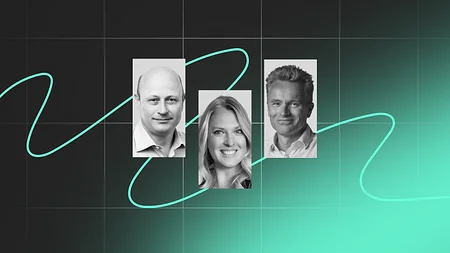Pump that Money
In this week’s news show we had representation from both sides of the Atlantic as Nina Mohanty, Doug Bobenhouse and Valentina Kristensen joined new host Ross Gallagher in his first rodeo in the hosting seat, and Simon Taylor to discuss the week’s biggest stories.
Listen here for the episode in full, stream it below or read on for additional insights.
Is open banking pumping money into the UK economy?
As another news show, another open banking prediction, and we kicked off with this story from CityAM where a study by the Centre for Economics and Business Research [Cebr] and Trustpilot claims Open Banking could provide a £1bn boost to the UK economy. "Our analysis suggests Open Banking will have a positive impact on UK GDP as additional funds become available for productive use in the wider economy, but the degree to which these economic benefits are realised is dependent on the readiness of consumers to consent to sharing data," says Cedr. The team debate whether or no this sounds realistic. It's important to remember that the money is dependent on customers sharing their data, Ross reminds us, which studies suggest many are not keen to do -"The numbers are important but at this stage they're largely academic", Ross Gallagher."The numbers are important but at this stage they're largely academic", Ross Gallagher.Despite this, Simon celebrates the fact that this is the first positive open banking story we've yet seen from a mainstream news outlet. If it's true it's great says Nina - "pump that money!" Valentina muses over what open banking might've looked like if business banking was affected ahead of consumer banking, and Doug mourns the fact that open banking just isn't a thing yet in the US - "we don't have any such thing" - Doug Bobenhouse.
Lloyds (latest) digital transformation
From boosting the economy by £1bn to a transformation worth £3bn, we take a look at this announcement from Lloyds, revealing their plans for "a major overhaul of their digital offering with £3bn investment plan". Lloyds claim they will spend £3bn over 3 years to “transform” themselves into a "digitised, simple, low risk, customer focused, UK financial services provider". This xost is up 40% on the previous three-year plan, which saw thousands of jobs cut as the bank re-engineered the business to take advantage of new mobile and online channels. However the new plan is aimed at reducing operating costs to less that £8 billion in 2020 and a cost:income ratio in the low 40s. Valentina is not impressed: "it's like a dick measuring contest of who can spent the most", she suggests that for tht sum lloyds should stop trying to transform themselves and just buy the four biggest fintechs in the UK, but she does point out what she calls "the only positive" in this story, which is their commitment to low cost: income ratios. Ross points out that Lloyds are only making a splash about how much their spending, not what they're planning to spend the money on, and Simon says it's like they're "proud to be the least worst" of the incumbents."It's like a dick measuring contest of who can spent the most" - Valentina KristensenThere was also lots of discussion on FIN about Lloyds calling themselves ‘the UK’s #1 digital bank’. Share your thoughts here.
Virgin Money's Digital Disruption
From one huge payout on digital transformation to a [slightly] smaller one as this story in Finextra announced Virgin Money spends 38.3 million to build new digital bank. Virgin Money is aiming to broaden its appeal in the SME market and extend its offering into current accounts and savings through the creation of a "data-driven, customer-centric" digital bank, which aims to take advantage of PSD2. Virgin Money signed a contract with 10x Future Technologies, the fintech startup established by former Barclays chief Antony Jenkins, in November 2016 to build a digital core for the new business. 10x Future Technologies’ API brings legacy systems together in a single secure network, providing access to all the relevant customer info to find them the best product in a fraction of the time it currently takes. Despite this, there was a lot of eye rolling in the team, who were not impressed that their offering so far is just an app "They're putting lipstick on a pig" says Doug, for 38.3 million it should be very nice lipstick, says Valentina, "Maybe they're born with it, maybe it's Virgin Money" mocks Nina."Maybe they're born with it, maybe it's Virgin Money" - Nina Mohanty
easyJet launches easyMoney
From one airline brand taking on big banks to another, in the next story the easyJet CEO Stelios Haji-Ioannou announces his plans to to take on big banks with easyMoney . They will be launching an individual savings account (ISA) product in Britain under a new easyMoney brand, aiming to win business by offering better interest rates than banks. The easyMoney ISA aims to offer investors a 4.05 percent annual interest rate, compared to other similar easy-access cash ISAs which offer 1.21 percent interest. The returns are not guaranteed. They're also offering a discounts card to customers who invest more than 1k. easyMoney's new ISA will compete with other providers such as Funding Circle which offers 7% rates easyMoney joins other brands in the easyGroup: easyHotel, easyBus, easyCar, easyProperty, easyOffice, easyFoodstore, easyCoffee and easyGym. Is this an “easy” next move for easyJet? Are they looking to emulate Virgin Money? Doug says this is "a weak attempt. If you're going to go, go!" The team seem to be in general agreement that this is quite a weak first offering, with Valentina pointing out that the brands within the "easyGroup" seems to be using the approach of "let's try everything and see what sticks""[This is] a weak attempt. If you're going to go, go!" - Doug BobenhouseShare your thoughts here.
New Yorks fights cybercrime
Moving away from UK airlines taking on banks, to the other side of the Atlantic where this story gives us the worrying news that New York is quietly working to prevent a major cyber attack that could bring down the financial system. (This seems like a good idea, says Ross.) With a lack of leadership from the federal government, New York is one of the first states to implement new cyber regulations. The state is quietly working to prevent a major cyber attack that could bring down Wall Street's financial system. But even with the strictest cybersecurity regulations in the country, experts warn New York's efforts may still not be enough. Cybersecurity in New York's financial industry was previously governed by voluntary frameworks and suggested best practices. "Why isn't this being federally led?" asks Nina. In 2016, hackers attacked companies in the financial services sector more any other industry - Over 200 million financial records were breached that year, a 937% increase from 2015. But the New York Department for Financial Services [NYDFS] introduced, for the first time, regulations that would be mandatory, including charging firms fines if they didn't comply. "It's sad that there had to be consequences before this happens" said Simon."Why isn't this being federally led?" - Nina MohantyIs it scary to think that previously cyber security had only been voluntary and not mandatory? Share your thoughts here.
Square backs bitcoin
From new cybersecurity regulations, to the unregulated crypto space as this story reveals Square 'is not stopping at buying and selling' bitcoin, according to CEO, Jack Dorsey. Payments app Square launched support for bitcoin in November, and CEO Jack Dorsey has doubled down on the company’s stance, saying the company "is not stopping at buying and selling" bitcoin. ‘We do believe this is a transformational technology, and we want to learn as quickly as possible’. In the final quarter of 2017, the company earned an adjusted $0.8 per share, beating the $0.067 that Wall Street was expecting. Simon admits his fintech crush on Jack Dorsey and says he sits in the tech and finance Venn diagram like no one else. Could Square's support of bitcoin be a form of "creeping legitimisation" of the coin? We shall see. Share your thoughts here.N26 grows up and gets profitable
From an adjusted share price to a growing profit margin as the next story explains how Online Bank N26's growth 'on track' and making a profit from every customer. N26 is now profitable and claims they gain 2000 customer per DAY, and their focus remains on growth - they're aiming to get from 500k customers as of August 2017 to 2 million “as fast as possible” said CEO Valentin Stalf. "I love this story because it's about unit economics" says Simon. Nina is even more keen: "I have a crush on N26" and the team discuss whether in our UK fintech bubble we tend to forget about them as a real contender. However N26's other focus is on branding: current branding only reaches 2-5% of the German public, to expand they need to become more widely known. This leads to a discussion of the highly concentrated German banking market and what approach N26 might need to take to properly break this."I love this story because it's about unit economics" - Simon TaylorWant to check out N26? We have multiple user journeys from N26’s German offering in our competitor insights platform, 11:FS Pulse. On demand video of the best digital banking journeys on the planet. Go to 11fspulse.com to find out more
The app helping kids to save
Next up, while fintechs are often aimed at the younger generations, this app is taking that one step further as an interview with its CEO reveals how the app GoHenry teaches your kids how to save money:- The app comes with a VISA card available to kids aged 6+
- Parents retain total control over the card. They can even decide where the children are allowed to use it.
- Kids can also earn money for chores from within the app - in the words of their CEO “This way, kids learn that there is a relationship between what they do and what they can buy.”
"Get people while they're young and give them value" - Simon Taylor
Contactless card innovation for the homeless
Following on from last week’s story about the Big Issue seller who used a contactless card reader to boost his sales, in this story, an Amsterdam-based advertising agency, has created a contactless payment jacket that allows people to donate 1€ to the wearer using their contactless smart card. The jacket has a card reader sewn into it, and in order to donate 1€ to the wearer, all you have to do is hold the card close to the jacket for a few moments, it also comes with an LCD screen which constantly displays instructions of use. The fixed sum (one euro) goes into a bank account managed by a homeless shelter, and can only be used to purchase a hot meal, pay for a bath or spend a night at a homeless shelter. It also means the person donating knows what their money goes towards. The team debate whether this story really is a good thing or is it patronising or "nanny state-ism" in Ross's words as it doesn’t trust the homeless to manage their own cash? The general consensus was (as summed up by Ross) "We like this as long as it's done in the right way" - Ross Gallagher."We like this as long as it's done in the right way" - Ross Gallagher.
And finally….
Despite having already covered it on Blockchain Insider, we couldn't finish the show without mention of this excellent story from The Verge where 50 Cent admits in bankruptcy document that he never actually owned any bitcoin and therefore he did not, in fact, make $8 million in bitcoin by accepting the cryptocurrency as a form of payment for his album Animal Ambition back in 2014, despite headlines at the time saying he did. He claimed he only went along with the publicity because he never turns down press coverage unless it “causes irreparable damage to my brand”. Wisecrackers on Twitter are now suggesting he should change his name to 0.000095 Bitcoin He had previously tweeted about his bitcoin wealth but to prove that he is bankrupt, he had to reveal that he does not own any bitcoin. "how did he reveal he had no bitcoin?" questions Simon, raising the interesting conundrum of how you prove you don't have something, and likewise pointing out he could have a locked wallet somewhere hidden that no one knows about. "It's all very convenient" says Valentina, that when filing for bankruptcy he suddenly didn't have $8 million in crypto riches."how did he reveal he had no bitcoin?" - Simon TaylorAs good Ol’ Fiddy would say: Get Bits or Die Tryin’... but now the courts have 21 Questions for him - maybe he owns ‘Just a lil bit’? Listen back to the episode in full here. To ensure you never miss an episode, subscribe to Fintech Insider now! Come talk to us @11FSTeam or @FintechInsiders on Twitter or hello@11fs.com if you want to send us an email.




